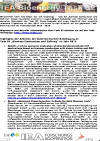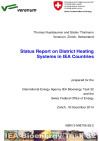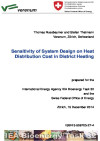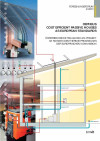Suchergebnisse für "Factsheet: Energietechnologien gestalten, die für alle sinnvoll und nutzbar sind"
IEA Bioenergy Task 32 "Biomass Combustion and Cofiring"- Newsletter 01/2016

Herausgeber: Institut für Prozess- und Partikeltechnik
Deutsch, 4 Seiten
Downloads zur Publikation
IEA Bioenergy Task 39: Newsletter, Ausgabe 54, Mai 2020

Der Schwerpunkt dieser Ausgabe liegt auf dem Artikel zum Thema „Biofuels Production and Consumption in Germany: Status, Advances and Challenges“.
Mahmood Ebadian, Jack Saddler, Jim McMillan
Herausgeber: IEA Bioenergy Task 39, 2020
Englisch, 20 Seiten
Downloads zur Publikation
IEA Bioenergy Task 39, Newsletter, Ausgabe 53, December 2019

Diese Ausgabe enthält einen Artikel zum Thema „Biofuels Production and Consumption in Denmark: Status, Advances and Challenges“ sowie weitere aktuelle Informationen aus dem Task.
Mahmood Ebadian, Jack Saddler, Jim McMillan
Englisch, 16 Seiten
Downloads zur Publikation
openVALUE - Quality and Weight of Open Spaces of Urban Building Projects
Based on four case studies the comprehensive contribution of open space to the increase of quality in real estate development was presented and provides the basis for the development of application oriented measures of quality management and strategies for innovative solutions.
Sustainable trend-setters - LOHAS on the way to a sustainable society
"Sustainable trendsetters" investigated the consumer group "cultural creatives" by applying the Q-methodology. It provides criteria for product development and promotion of LOHAS products and services in the sustainable textile sector and for sustainable tourism.
Climate Scan District - Exploration and evaluation of potential districts regarding their suitability as a pioneer district
The "Climate Scan District" project aims to select the most suitable pioneer district in Dornbirn by applying the klima:aktiv criteria catalog for climate-neutral districts. This supports the city's transformation to climate neutrality by 2040. Extensive district profiles, action plans, and future visions are developed to create a well-founded and comprehensive basis for decision-making.
GeoDatKlim - Geo Data and Satellite Data for Carbon Neutral Cities
The Vienna Geospace Hub innovation lab will help optimize the application of geospatial and satellite data to solve complex urban challenges. The innovation lab serves as a networking platform for administration, science, economy, as well as a development and test environment for innovative use cases.
ThermEcoFlow: Innovative technologies and methods for indoor air comfort and energy optimisation in thermal spa buildings
ThermEcoFlow aims to optimize the energy consumption of thermal spas facilities through improved simulation models and AI-supported control systems. By precisely modelling airflow, humidity loads, and evaporation, combined with AI-driven regulation, the project seeks to reduce energy consumption and CO₂ emissions in the long term while enhancing indoor comfort for visitors.
FROSCHBERG 2.0 - Designing existing neighborhood(s) to be renewable and replicable
Exploration of replicable solutions for the socially acceptable transformation of existing neighbourhoods towards climate neutrality using the example of the Froschberg workers' housing estate. The result, the presentation and integration of climate neutrality into the refurbishment roadmap for the Froschberg workers' housing estate, serves as a starting point for implementation in a follow-up project.
Thannhausen 2.0 - Thannhausen energy district: a role model and testbed for a renewable energy supply for neighbourhoods
Evaluation and testing of different energy distribution approaches in a neighbourhood using direct lines, storage or new legal options through the ElWG (Electricity Industry Act). The project builds on the existing direct line system in Thannhausen and will test different use cases for the (climate-neutral) supply of neighbourhoods there.
WISE - Extension of the safety concept for heat pumps with flammable refrigerants for gas boiler replacement
In the project "WISE", safety concepts are being developed for the event of a leak in which flammable refrigerant escapes from the refrigeration circuit. These concepts aim to ensure a higher level of safety for residential installations than is currently required by the safety standard.
Status Report on District Heating Systems in IEA Countries (2014)

IEA Bioenergie Task 32
Thomas Nussbaumer, Stefan Thalmann
Herausgeber: Verenum und Schweizer Bundesamt für Energie
Englisch, 48 Seiten
Downloads zur Publikation
Mit Nachwachsenden Rohstoffen Auf Dem Weg Zur Nachhaltigkeit

Theoretische Grundlagen, Chancen & Perspektiven
Forschungsforum
3/1997
Herausgeber: BMVIT
Deutsch, 6 Seiten
Downloads zur Publikation
Sensitivity of System Design on Heat Distribution Cost in District Heating (2014)

IEA Bioenergie Task 32
Thomas Nussbaumer, Stefan Thalmann
Herausgeber: Verenum und Schweizer Bundesamt für Energie
Englisch
Downloads zur Publikation
Development of the first legally compliant verification procedure for plus-energy buildings by a complete revision of the ÖNORMS
Within the project the current Austrian standards concerning building services and building physics have been revised and further developed to provide the designers with standardized calculation algorithms for the design of plus-energy buildings.
Cepheus Cost Efficient Passive Houses As European Standards

Österreichische Teilnahme am Projekt im Rahmen des THERMIE-Programms der Europäischen Kommission
Forschungsforum
2/2001
Herausgeber: BMVIT
Deutsch, 6 Seiten
Downloads zur Publikation
Ecological Passive houses

Discussion of transfer of know how for ecological passivehouses, networking (national and international)
Haus der Zukunft in der Praxis Themenworkshop 12: Innovationen im großvolumigen Wohnbau
23. Okt 2006
FFG, Sensengasse 1
1090 Wien, AT
Themenworkshop aus der Reihe Haus der Zukunft in der Praxis
Workshop: Anwendung der Passivhaustechnologie im sozialen Wohnbau
28. Apr 2003
TU Wien, Prechtlsaal, Karlsplatz 13, Hauptgebäude, Stiege 1, ErdgeschossWien, AT
Startworkshop zum Projekt aus der Programmlinie "Haus der Zukunft"
